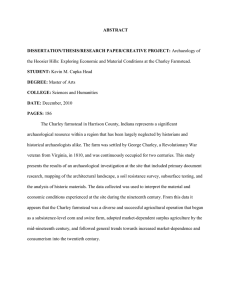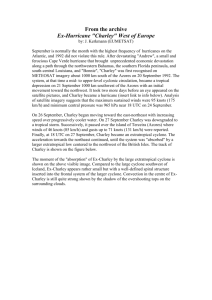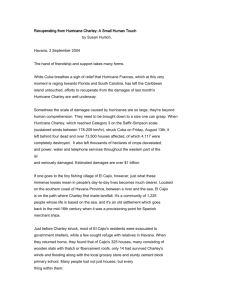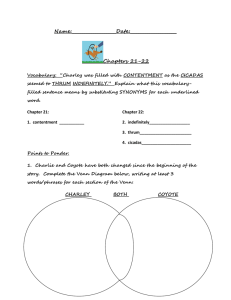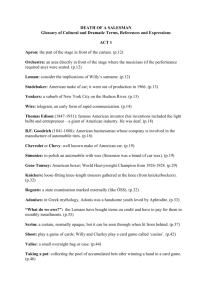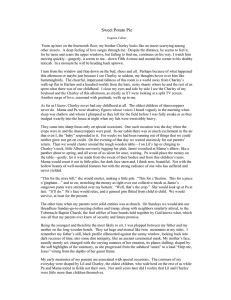Name: ______________________________________ Study Guide Grade: _____ / 50
advertisement
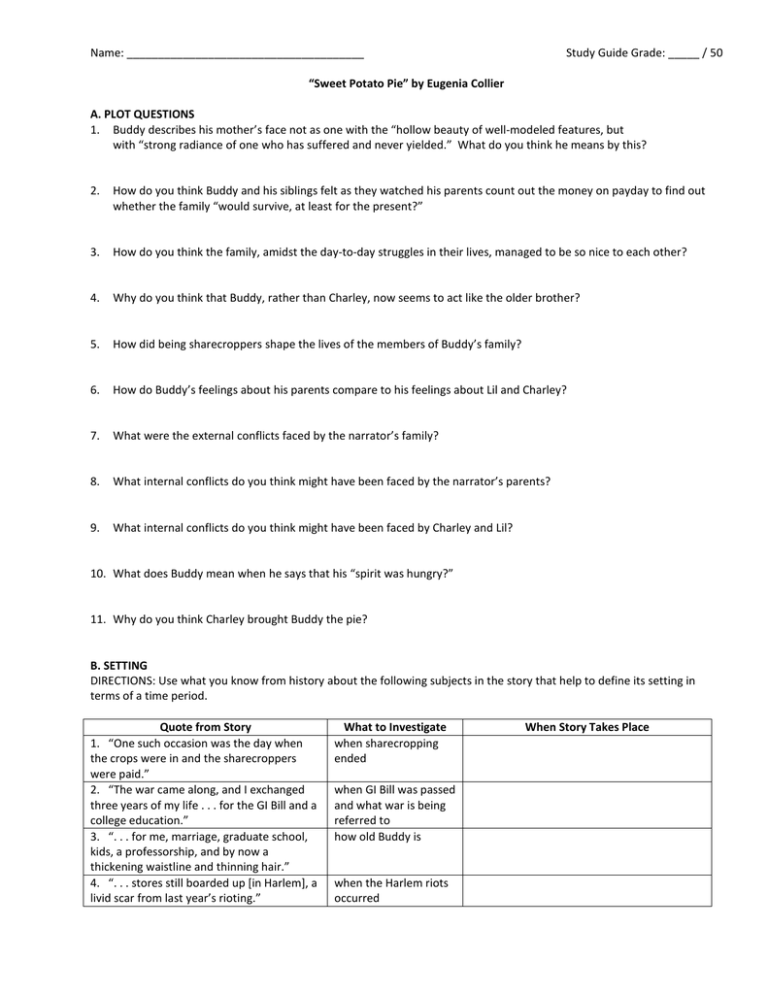
Name: ______________________________________ Study Guide Grade: _____ / 50 “Sweet Potato Pie” by Eugenia Collier A. PLOT QUESTIONS 1. Buddy describes his mother’s face not as one with the “hollow beauty of well‐modeled features, but with “strong radiance of one who has suffered and never yielded.” What do you think he means by this? 2. How do you think Buddy and his siblings felt as they watched his parents count out the money on payday to find out whether the family “would survive, at least for the present?” 3. How do you think the family, amidst the day‐to‐day struggles in their lives, managed to be so nice to each other? 4. Why do you think that Buddy, rather than Charley, now seems to act like the older brother? 5. How did being sharecroppers shape the lives of the members of Buddy’s family? 6. How do Buddy’s feelings about his parents compare to his feelings about Lil and Charley? 7. What were the external conflicts faced by the narrator’s family? 8. What internal conflicts do you think might have been faced by the narrator’s parents? 9. What internal conflicts do you think might have been faced by Charley and Lil? 10. What does Buddy mean when he says that his “spirit was hungry?” 11. Why do you think Charley brought Buddy the pie? B. SETTING DIRECTIONS: Use what you know from history about the following subjects in the story that help to define its setting in terms of a time period. Quote from Story 1. “One such occasion was the day when the crops were in and the sharecroppers were paid.” 2. “The war came along, and I exchanged three years of my life . . . for the GI Bill and a college education.” 3. “. . . for me, marriage, graduate school, kids, a professorship, and by now a thickening waistline and thinning hair.” 4. “. . . stores still boarded up [in Harlem], a livid scar from last year’s rioting.” What to Investigate when sharecropping ended when GI Bill was passed and what war is being referred to how old Buddy is when the Harlem riots occurred When Story Takes Place C. PRACTICE WITH DIALECT A dialect is a version of a language spoken by the people of a particular place, time, or social group. Dialects are usually a combination of different languages and cultures, and are also known as a patois. Linguists, or people who study language, recognize African-American English as a dialect of American English used by many African-Americans in certain settings and circumstances that originated in the south and moved north as African-Americans migrated away from lives of poverty. Dialect in Story 1. “This for piece o’gingham . . .” Re-write the lines from the story using Standard American English 3. “If you got to depend on your looks for what you get out’n this world. . . .” 4. “Ain’t nothing you can’t do if you got learning.” 6. “You somebody.” 7. “Well, ain’t no two a y’all in the same city. An’ everybody scratchin’ to make ends meet. . . .” D. MAKING CONNECTIONS ACROSS GENRES 1. Read Langston Hughes’s poem “A Dream Deferred.” Write a sentence or two summarizing what the poem says about people whose dreams are always deferred (if you don’t know what deferred means, look it up or talk to me). “A Dream Deferred” by Langston Hughes (1951) What happens to a dream deferred? Does it dry up like a raisin in the sun? Or fester like a sore-And then run? Does it stink like rotten meat? Or crust and sugar over-like a syrupy sweet? Maybe it just sags like a heavy load. Or does it explode? SUMMARY: ___________________________________________________________________________________________ E. CHARACTER STUDY: Charley Characterization is the act of creating or describing a character. We learn about Charley from what the narrator—his brother—tells us about him, specifically what the narrator describes Charley doing and saying. Answer the questions under each quote to show what is revealed about Charley. Evidence from Text “Charley’s quick fingers guiding a stick of charred kindling over a bit of scrap paper, making a wondrous picture take shape—Jamie’s face or Alberta’s rag doll or the spare figure of our bony brown dog.” “Inevitably each child had to leave school and bear his share of the eternal burden.” “Charley, on the end of the row, still somehow the protector of them all. Charley, looking as if he were in the presence of something sacred.” Points about Charley 1. What was Charley’s dream? 2. Why did Charley have to give up his dream? 3. What became Charley’s substitute dream? E. LAST DISCUSSION QUESTION – BE READY TO CONTRIBUTE (SO TAKE NOTES) Why doesn’t Charley succumb to desperation or explosion as expressed in “A Dream Deferred?” NOTES: ______________________________________________________________________________________________
